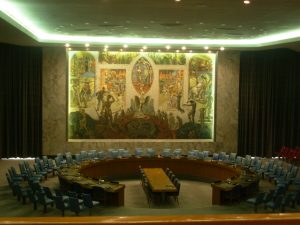On Wednesday, India became a non-permanent member of the United Nations Security Council (UNSC). Last year, India’s candidature received undisputed support from all countries in the 55 member Asia-Pacific Group for its bid to secure the seat for a two-year term in 2021-22.
The development is particularly significant for Pakistan, as the country faces diplomatic challenges from India at the United Nations.
For decades, India has sought the permanent membership at the UNSC. To reach this goal, India has used its non-permanent status as a stepping stone to prepare a bid for the permanent candidacy. In the past, India has held the same position seven times. For years, New Delhi has worked closely with the so-called G-4 group, with Brazil, Japan, and Germany, to push for structural reforms within the UNSC.
UNSC reform has been considered necessary for decades. Experts believe that a lack of reforms has produced a “highly unequal and inefficient” Security Council. “The five permanent members (P5) – Britain, France, United States, Russia, and China – possess permanent seats and have the privilege of the veto whilst the status of non-permanent members is low,” notes a study. The current structuring of the UNSC converges most of the power to the P5, while non-permanent members of the council have been “relegated to a role of rubberstamping.”
Still, India’s election as a non-permanent member for another two-year term helps the country’s in its attempt to push for the association’s reforms and solidify its image as a major power that should be accommodated by the permanent members of the assembly.
India’s attempt to find a permanent place at the UNSC has always been opposed by Pakistan. Over the past few decades, the matter of the UNSC’s expansion has generated a range of controversies. The dispute involves individual stakeholders and regional blocks that compete for different positions and interests. For its part, Pakistan has perpetually viewed the situation from an India-focused lens. Pakistan sticks strongly to the view that if India is to become a permanent member of the UNSC, it should also attain the same position.
For Pakistan, the implications of India as a permanent member of the UNSC can be huge. If such an outcome emerged, Pakistan’s efforts to engage the UNSC over the issue of Jammu and Kashmir (J&K) could be undermined. Pakistan considers UNSC interventions in J&K as a win for its attempt to make the issue an internationally recognized dispute. Moreover, Pakistan’s nuclear program can also come under greater scrutiny. For instance, India which is a permanent member of the UNSC, can demand that Pakistan give up its nuclear weapons, sign the Nuclear Non-Proliferation Treaty, and put in place an effective regime to contain terror financing. In effect, from Islamabad’s perspective, India as a permanent member of the UNSC can become a threat to Pakistan’s core security and diplomatic interests.
To Pakistan’s benefit, the issue of UNSC expansion is larger than the Pakistan-India difference and involves scenarios that have global implications. Going forward, Pakistan would either want the international community to do away with the system of permanent seats altogether or become a member itself if India is offered the position.
In the past, Pakistan itself has been elected as a non-permanent member of the UNSC seven times. In part, Pakistan’s attempt has been in response to India’s search for the same position multiple times. Last year, Pakistan supported India’s candidacy at the Asia-Pacific Group for another two-year term partially because Islamabad has been given similar support institutionally. The current government in Pakistan has defended its support for India’s non-permanent member candidacy as “a routine affair” that doesn’t harm Islamabad’s interests.
In Islamabad, some analysts hold to the view that as long as Pakistan has China’s support, India is unlikely to become a permanent member of the council. Outside the permanent membership parameters, India and Pakistan have held the same posts multiple times which elevates Islamabad’s status to that of New Delhi at the committee. Thus, Pakistan shouldn’t be worried about India’s non-permanent member status at the council.
Islamabad is planning to file its next candidature for another non-member seat in 2025. If elected, it would be Pakistan’s 8th round at the council.
For now, Pakistan is content with the fact it has been at the council for the same duration that India has been.

































